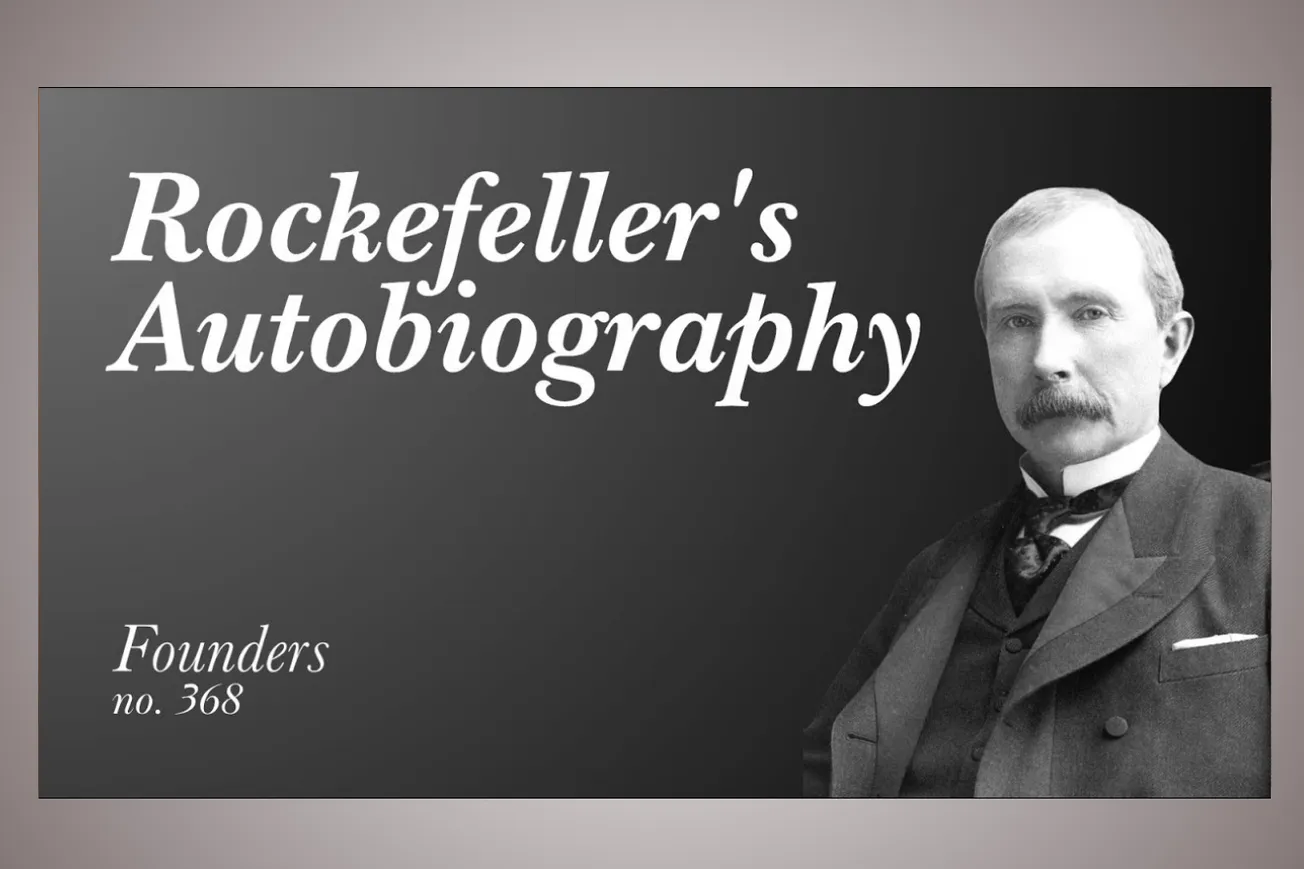Table of Contents
Discover timeless business wisdom from John D. Rockefeller's 1909 autobiography "Random Reminiscences of Men and Events." Learn the strategic principles, partnership secrets, and operational insights that built Standard Oil into the world's most valuable company from America's first billionaire.
Key Takeaways
- Rockefeller believed in extreme secrecy about successful business operations, following the principle that "bad boys move in silence"
- He prioritized building a core team of exceptional partners and maintained those relationships for decades, creating what he called a "seamless web of deserved trust"
- The foundation of Standard Oil's success was obsessive attention to detail, knowing every financial aspect of the business down to the penny
- Rockefeller maintained a "fortress of cash" strategy, always preparing for financial emergencies long before they were needed
- His competitive advantage came from economies of scale, negotiating superior transportation rates, and relentless focus on operational efficiency
- He advocated for hiring talent based on enthusiasm and intelligence rather than experience, believing people could learn necessary skills
- The key to lasting success was focusing on service to others rather than personal enrichment, as "money comes naturally as a result of service"
The Power of Strategic Silence and Secrecy
When John D. Rockefeller published his autobiography in 1909 at age 70, he made a fascinating admission that reveals one of his core business philosophies. "It has not been my custom to press my affairs forward into public gaze," he wrote—what he called "the understatement of the century." This wasn't false modesty; it was strategic thinking at its finest.
Rockefeller understood something that many modern entrepreneurs miss: once you discover something that works, the worst thing you can do is broadcast it to the world. He followed what could be called the "bad boys move in silence" principle throughout his career. This approach protected Standard Oil from unnecessary competition and allowed the company to build insurmountable advantages while competitors remained oblivious to their strategies.
The biography reveals how Rockefeller transmitted messages in code and maintained secrecy across all operations. As he explained it, "I wonder what general ever sends out a brass band in advance with orders to notify the enemy that on a certain day he will begin an attack." This military-style approach to competitive intelligence gave Standard Oil years of runway to establish market dominance before competitors could respond effectively.
What's particularly striking is how this principle appears throughout entrepreneurial history. Rockefeller shares an example of a modern founder who told a friend, "What you have is working, so shut up about it," explaining how all the attention he received when his business was successful created unwanted competition that lasted for decades. The lesson here isn't about being secretive for its own sake, but about being strategic with information that could undermine your competitive position.
Building an Unbreakable Foundation Through Partnerships
Perhaps the most revealing aspect of Rockefeller's memoir is how he dedicated the entire first chapter to friends and business partners. Here was the richest man on the planet, and instead of talking about his wealth, he spent his time reminiscing about the people who helped him build his empire. This wasn't sentimentality—it was recognition of a fundamental business truth.
"In looking back over my life, the impressions which come most vividly to my mind are mental pictures of my old associates," Rockefeller wrote. These weren't casual business relationships; they were deep, decades-long partnerships built on what he called "a seamless web of deserved trust." Many of his core partners worked together for 30, 40, even 50 years, creating an institutional knowledge and operational efficiency that competitors couldn't match.
The story of John D. Archbold perfectly illustrates Rockefeller's approach to talent acquisition. When checking into a hotel, Rockefeller noticed one guest had signed his name as "John D. Archbold, $4 a barrel"—adding his business slogan after his signature. This wasn't just enthusiasm; it was the kind of conviction and energy Rockefeller looked for in partners. Archbold became one of Standard Oil's most important executives, and their partnership lasted decades.
But Rockefeller's partnership philosophy went deeper than just finding talented people. He believed in creating an environment where "strong, forceful men" could disagree openly and work through complex problems together. "If I have to choose between agreement and conflict, I'll take conflict every time," he said, echoing what Jeff Bezos would later say about productive disagreement. "It always yields a better result."
The key was ensuring that despite heated discussions, all decisions ultimately required unanimous agreement. This wasn't about avoiding conflict—it was about using conflict constructively to reach better decisions. Rockefeller tells the story of a $3 million investment decision where one partner was completely opposed. Instead of forcing the issue, Rockefeller offered to personally fund the investment and bear the risk if it failed. This approach transformed opposition into partnership, with his colleague saying, "If that's the way you feel about it, we'll go in together."
The Obsession with Financial Precision and Control
One of the most striking aspects of Rockefeller's approach was his obsessive attention to financial detail. This wasn't just good bookkeeping—it was a strategic advantage that many of his competitors completely missed. "I had a passion for detail," he wrote, and this passion extended to every aspect of the business, no matter how small.
Rockefeller's background as a bookkeeper gave him tremendous respect for "figures and facts, no matter how small they were." He tells a story about watching a neighbor's office where the local plumber presented "a bill that was about a yard long." The office manager barely glanced at it before telling his bookkeeper to pay it. Rockefeller was appalled by this casual approach to expenses, saying, "This casual way of conducting affairs did not appeal to me."
His approach was dramatically different: "I would study the same plumber's bill in great detail, checking every item." This level of scrutiny extended throughout Standard Oil's operations. While competitors were running their businesses with what he called "unintelligent competition," not even knowing "when they were making money or when they were losing money," Rockefeller's team knew exactly where every dollar was going.
This financial precision created multiple advantages. First, it allowed Standard Oil to identify and eliminate inefficiencies that competitors couldn't even see. Second, it enabled accurate forecasting and planning. Third, it created a culture of accountability where waste was immediately visible and correctable. "We knew how much we made and where we gained or lost," Rockefeller explained, contrasting this with competitors who "kept their books in such a way that they did not actually know when they were making money."
The broader principle here is about honesty with yourself and your business reality. "Many people assume that they can get away from the truth by avoiding thinking about it," Rockefeller observed, "but the natural law is inevitable, and the sooner it is recognized, the better." This meant facing uncomfortable truths about costs, efficiency, and profitability rather than hoping problems would solve themselves.
The Fortress of Cash Strategy
Throughout his career, Rockefeller maintained what can only be described as a "fortress of cash" approach to financial management. This wasn't just conservative financial planning—it was a strategic weapon that gave Standard Oil enormous advantages over competitors, especially during economic downturns.
"I was always a great borrower in my early days," Rockefeller admitted, "but we were accustomed to prepare for financial emergencies long before we needed the funds." This approach sounds remarkably similar to Warren Buffett's philosophy of maintaining large cash reserves and Napoleon's military maxim about keeping ammunition, food supplies, and repair facilities readily available.
The strategic value of this cash fortress became clear during financial panics and economic downturns. While competitors struggled to survive, Standard Oil could not only weather the storm but actually expand by acquiring distressed assets at favorable prices. "It is impossible to comprehend Rockefeller's breathtaking ascent without realizing that he always moved into battle backed by abundant cash," one biographer noted. "Whether riding out downturns or coasting on booms, he kept plentiful reserves and won many bidding contests simply because his war chest was deeper."
This financial discipline extended to how Standard Oil handled growth and dividends. Even when the company was generating enormous profits, they retained significant earnings within the business rather than distributing everything to shareholders. This created a self-reinforcing cycle where financial strength enabled strategic opportunities, which generated more cash, which created even more opportunities.
The lesson here isn't just about maintaining cash reserves—it's about understanding how financial strength creates strategic options. When you have adequate cash, you can take advantage of opportunities that cash-strapped competitors cannot. You can invest in new technology, acquire struggling competitors, or simply outlast economic downturns that force others out of business.
Competitive Advantage Through Operational Excellence
Rockefeller's description of Standard Oil's competitive strategy reads like a masterclass in building sustainable advantages. Rather than competing on a single dimension, he created a web of interconnected advantages that made the company virtually unbeatable in its core markets.
The foundation was economies of scale. "I ascribe the success of the Standard Oil Company to its consistent policy of making the volume of its business large through the merit and cheapness of its products," he wrote. But this wasn't just about being big—it was about using that size to create specific advantages that smaller competitors couldn't match.
Standard Oil "spared no expense in utilizing the best and most efficient methods of manufacturing" and "sought out the best superintendents and workmen and paid the best wages." They were willing to "sacrifice old machinery and old plants for new and better ones" and placed "factories at the points where they could supply markets at the least expense." This operational excellence created cost advantages that could be passed on to customers in the form of lower prices.
Perhaps most importantly, they focused on extracting value from every aspect of their operations. Standard Oil "not only sought markets for its principal products, but for all possible by-products, sparing no expense in introducing them to the public in every nook and corner of the world." This comprehensive approach to value creation meant they could generate revenue streams that competitors missed entirely.
The company also invested heavily in transportation infrastructure, building "pipelines, special cars, tank steamers, and tank wagons" and erecting "tank stations at railroad centers in every part of the country to cheapen the storage and delivery of oil." These investments created logistical advantages that were extremely difficult for competitors to replicate.
What's remarkable is how these advantages reinforced each other. Lower costs enabled lower prices, which increased volume, which created more economies of scale, which enabled further cost reductions. The transportation infrastructure reduced costs while improving service, making it even harder for competitors to match their value proposition.
The Transportation Revolution and Negotiation Mastery
One of the most controversial aspects of Rockefeller's strategy was his approach to transportation costs, which became a major source of competitive advantage. Understanding this aspect of his business reveals important insights about negotiation, strategic thinking, and creating win-win relationships even in competitive situations.
Rockefeller discovered early in his career that posted shipping rates were merely starting points for negotiation. "The real rate of freight which any shipper paid was not known by his competitors nor by other railroad companies, the amount being a matter of bargain," he explained. While competitors accepted standard rates, Rockefeller negotiated aggressively for better terms.
But his approach went far beyond simple price negotiation. Standard Oil created value for railroad companies in multiple ways: they offered "freights in large quantity," provided "loading facilities and discharging facilities at great cost," furnished "regular traffic," and even "exempted railroads from liability for fire because it carried its own insurance." In return for these services, they obtained "contracts for special allowances on freights."
This wasn't just about getting lower rates—it was about creating a fundamentally different relationship with transportation providers. "Traffic from Standard Oil Company was far more profitable to the railroad companies than the smaller and irregular traffic which may have paid a higher rate," Rockefeller noted. By making themselves more valuable customers, they earned better treatment.
The strategic insight here is profound: instead of simply trying to negotiate better terms, Rockefeller restructured the entire relationship to create mutual value. The railroads made more money from Standard Oil's business even while offering lower rates, because the volume, regularity, and reduced risk more than compensated for the price reduction.
This approach also created strategic barriers for competitors. It wasn't enough for other oil companies to simply offer higher rates—they would need to match Standard Oil's volume, infrastructure investments, and service guarantees. Few competitors had the resources or strategic vision to make such investments.
The Art of Developing Talent and Delegation
Rockefeller's approach to talent development reveals another crucial aspect of his success: the ability to identify potential in people and develop them for roles they had never performed before. This wasn't just about hiring experienced talent—it was about creating a system for developing capabilities that didn't exist in the market.
One of the most revealing stories involves Mr. Bowers, who was put in charge of Standard Oil's shipping operations despite having "never been on a ship in his life" and probably not knowing "the bow from the stern." The recommendation came from Mr. Gates, who admitted the candidate's qualifications "are not the best" but emphasized his character: "He has good sense, he is honest, enterprising, keen, and thrifty. He has the art of quickly mastering a subject even though it is new to him and difficult."
Rockefeller's response was immediate: "Let's give him the job." The result was extraordinary. Mr. Bowers "studied the boats minutely," took charge of the entire fleet, managed dozens of vessels "with skill and ability," and even "invented an anchor which he used with our fleet and was later adopted by other vessels used in the United States Navy."
This example illustrates Rockefeller's broader philosophy about human potential. He believed that with the right character traits—intelligence, enthusiasm, honesty, and work ethic—people could master almost any skill. "People who do great things are doing them for the first time," as Mark Andreessen later observed, and Rockefeller built his organization around this principle.
The strategic value of this approach was enormous. Instead of competing for experienced talent in existing markets, Standard Oil could develop specialized expertise internally. This created loyalty, reduced hiring costs, and ensured that key knowledge remained within the organization. Many of Standard Oil's most important executives were people who had grown up within the company, trained "since boyhood" in its methods and culture.
Service Before Self: The Foundation of Lasting Success
Perhaps the most profound aspect of Rockefeller's philosophy was his belief that lasting success comes from focusing on service to others rather than personal enrichment. This wasn't just moral philosophy—it was practical business strategy based on understanding how sustainable wealth is actually created.
"If I were to give advice to a young man starting out," Rockefeller wrote, "I should say to him: do not begin your business career with the idea of getting from the world by hook or crook all you can. In the choice of your profession, let your first thought be: where can I fit in that I may be most effective in the work of the world? Where can I lend a hand in a way that most effectively advances the general interest?"
This service-first approach wasn't about altruism—it was about aligning personal success with genuine value creation. "Investigation will show that the great fortunes which have been made in this country have come to men who have performed great and far-reaching economic services," he observed. "The man will be most successful who confers the greatest service on the world."
Rockefeller understood that sustainable businesses must solve real problems for real people. "Commercial enterprises that are needed by the public will pay. Commercial enterprises that are not needed fail, and ought to fail." This meant focusing on creating genuine value rather than simply extracting wealth from existing systems.
He also warned against unnecessary duplication of existing services. "The one thing that you would be most careful to avoid in your investment of time and effort is the unnecessary duplication of existing industries," he advised. "The man who puts up a second factory when the factory in existence will supply the public demand adequately and cheaply is wasting the national wealth and destroying the national prosperity."
This philosophy extended to innovation and entrepreneurship. "It requires a better type of mind to seek out and support and create the new than to follow the worn paths of accepted success," Rockefeller noted. The greatest opportunities come from opening new fields rather than simply competing in crowded existing markets.
The Compounding Power of Consistent Excellence
Throughout his autobiography, Rockefeller emphasizes that Standard Oil's success wasn't the result of a single brilliant insight or lucky break, but rather the compounding effect of consistent excellence over decades. "This powerful organization has not only lasted, but its efficiency has increased over the years," he wrote. "For years the Standard Oil Company has developed step by step."
This step-by-step approach was crucial because it allowed the company to build capabilities gradually while learning from each stage of development. "None of us ever dreamed of the magnitude of what proved to be the later expansion," Rockefeller admitted. "We did our day's work as we met it, keeping well to our opportunities and laying our foundations firmly."
The emphasis on strong foundations was particularly important in an industry that many people thought was temporary. While competitors built "flimsy shacks," Henry Flagler insisted on substantial, permanent structures. "He always believed that if we went into the oil business at all, we should do the work as well as we knew how," Rockefeller recalled. "Everything should be solid and substantial, and nothing should be left undone to produce the finest results."
This long-term thinking created cumulative advantages that became impossible for competitors to match. The dividends Standard Oil paid decades later weren't just from current operations—they represented "the results of the savings and surplus gained through all the 35 or 40 years of the workings of the company."
The lesson here is about the power of consistent excellence compounded over time. Small advantages, maintained consistently, become enormous advantages that create sustainable competitive moats. This requires patience and discipline, but the results can be extraordinary.
Selected Quotes and Insights
"If you go to sleep on a win, you'll wake up with a loss."
This remarkable quote captures Rockefeller's internal dialogue as he went to sleep each night during Standard Oil's early success. He would tell himself: "Now a little success, soon you will fall down, soon you will be overthrown. Because you have had a good start, you think you are quite a merchant. Look out or you will lose your head—go steady." This demonstrates the psychological discipline required to maintain success over decades.
"The underlying essential element of success in business affairs is to follow the established laws of high-class dealing. Don't even think of temporary advantage. Do not waste your effort on a thing which ends in a petty triumph unless you are satisfied with a life of petty success."
This philosophy emphasizes the importance of building sustainable, ethical businesses rather than seeking short-term gains. Rockefeller understood that lasting success requires operating with integrity and thinking beyond immediate profits.
"Arguments versus capital: Writing a check separates conviction from conversation."
When faced with a partner who opposed a $3 million investment, Rockefeller resolved the disagreement by offering to personally fund the project and bear the risk if it failed. This approach transformed opposition into partnership because it demonstrated genuine conviction rather than mere opinion.
Conclusion
John D. Rockefeller's autobiography reveals that building lasting wealth isn't about finding shortcuts or exploiting temporary advantages—it's about creating sustainable systems that compound over time. His success came from combining operational excellence with strategic thinking, building deep partnerships, maintaining financial discipline, and focusing on genuine service to others. Perhaps most importantly, he understood that true competitive advantage comes from doing ordinary things extraordinarily well, consistently, over decades.
Practical Implications
- Maintain strict financial discipline and always keep cash reserves for opportunities and emergencies
- Focus on building long-term partnerships rather than transactional relationships
- Invest heavily in operational excellence and systematic improvement of all business processes
- Hire for character and potential rather than just experience, then develop talent internally
- Create multiple interconnected advantages rather than relying on a single competitive edge
- Keep successful strategies confidential until you've built insurmountable market position
- Prioritize service to others over personal enrichment as the foundation for sustainable success
- Think in decades, not quarters, when making strategic decisions about your business
- Maintain unanimous agreement on major decisions to ensure full team commitment
- Study your business finances down to the smallest detail to identify inefficiencies others miss





